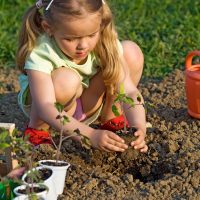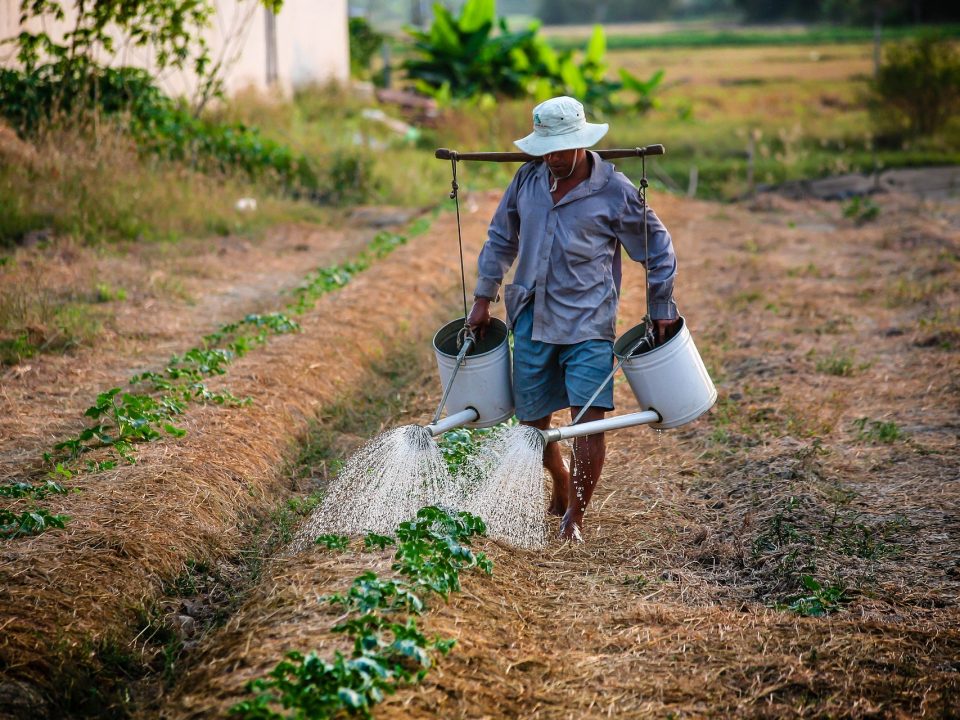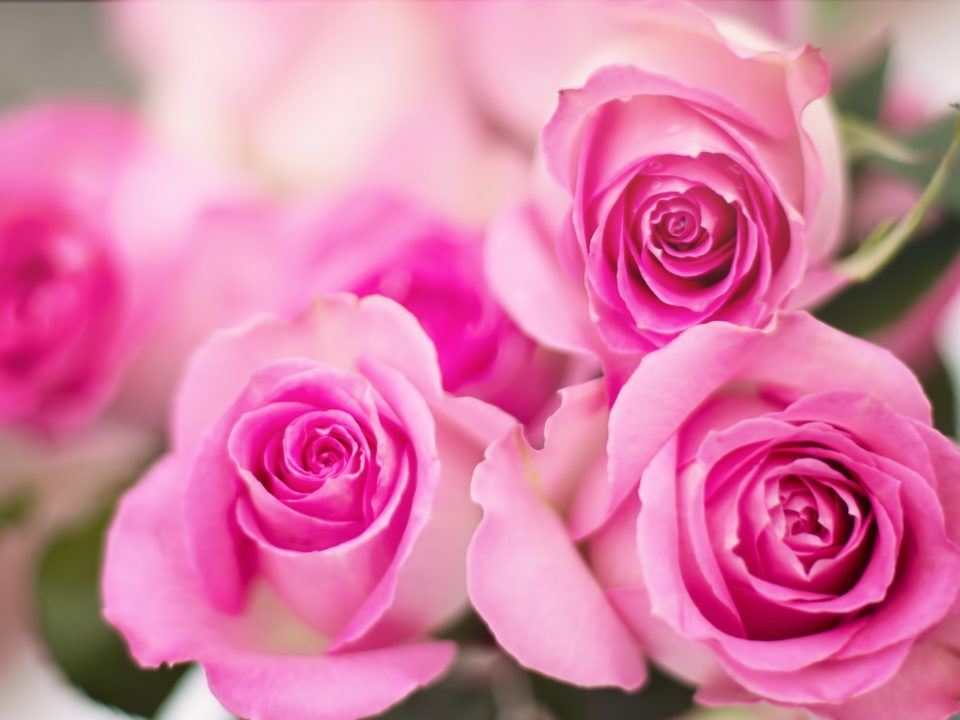Professional gardener

Fertilization in plants
June 3, 2018
Photosynthesis in plants
June 10, 2018Professional gardener – what talent is required?
“Oh, well, you’re doing well!” How many times have I heard this irritating phrase? And what do all the sages intend to do? Is plant growth really a kind of hidden, innate talent, like the talent to paint or sing without faking?
Curiosity and motivation
So far we present a story –
A man wants to decorate his balcony in the window boxes. He goes and buys planters, a planting platform, seedlings. He plants, drinks and hopes for the best. A week later, everything was absorbed (at best); In the second week some plants show signs of exhaustion; In the third week, all the plants go out. Those who have no interest in growing the plants themselves but in their final effect will go immediately to buy new seedlings, plant, drink and for him everything is in place.
And there are those who will do the same actions but for them they will not be the end of the verse but rather a beginning.
It would be the beginning of inquiry and observation. One would ask himself what had happened here? Why did the seedlings die?
A proper gardener will try to check the name of the plants he planted, and if the name is known he will try to find out what conditions are needed for this plant. Then perhaps he will discover that they were planted in light conditions that are either reversed or required, or that they were launched much less than needed.
Where would he find out? Perhaps in the nursery, if he had been a client of a good nursery, maybe a gardening expert,
Perhaps in a book about plants, perhaps in one of the sheets or through the Internet.
The ways are different, but what matters is the investigation.
The first secret weapon of the gardener, therefore, is curiosity. The desire to understand what happened. The second weapon is the willingness to bother and seek the information in different places.
Sensations in action
Another story –
Not all the seedlings died. Only a few. What does a real gardener do? He would not rush to replace the plants, but would probably bend right into the window boxes and look, and stick his fingers into the bed to feel the humidity and smell. This particular failure with some of the plants in planters will be for him,
Besides the source of frustration, also a challenge. Perhaps even a kind of springboard for accumulating knowledge, because in this scrutiny into the window, with this little pause, it might be that he would notice a small detail, for example, of dead plants that did not droop right next to them,
The original plant.
The third secret weapon, therefore, is the willingness to touch, feel, tuck the fingers.
A proper gardener is like a doctor or veterinarian who is not disgusted by his patients even when the sight is not particularly attractive. He knows when to touch, put his hand, smell close up (smell reveals a lot of information),
To make leaves, to watch intently. A good gardener is a gardener who mobilizes all his senses to understand what is happening around him. In this respect, our environment is like an open book, a university that is open to all who want it, and all that needs to be done is to want to browse, read, observe, listen, feel and smell.
Regular Torah
The fourth weapon of the gardener is somewhat invisible The kind of eye in the story we told, but not marginal, is the basic knowledge. Yes, what to do, you can not give up the need to learn and acquire knowledge. Organized knowledge can be purchased in a gardening course.
But you can also ask a suitable person (a certified gardener, an agronomist, a gardening instructor) to accompany him regularly in the garden and learn from him, not only about the theory, but also about the practical aspect of landscaping at least in the first period.
You can read in books, you can read on websites, but you can not give up basic knowledge of the basic principles of landscaping dealing with land in water and plant. Some of these principles are simple and can be intuitively perceived by anyone, but believe me, there are those who are not intuitive at all and if you do not understand what is behind the things you can fall straight on your nose. Thus, for example, an uneducated gardener will weed the weed and seidah, and may even scour them vigorously to get rid of them, and instead of disappearing, they only thrive on one another. A well-educated gardener knows that every act of kiltor or cutting-activities characteristic of expropriation-actually divide the plant again and again as if it were planting.
We will return to the same owner of a garden that sees signs of harmful visits to its plants. You may have heard a friend recommend that to find out who is devouring the plant, it is advisable to arrive at night with a flashlight and look.
If he is a gardener in his soul, he will not scoff at such a recommendation (what, I have nothing to do with life other than chasing after plant pests?). On the contrary, he will be happy to find out what is eating his favorite plants and will even catch the criminals with blood / juice on their hands. This is the most effective weapon for the gardener – to open the ears,
To hear about other people’s experiences, to absorb as much of the environment as possible.
Connection and Link
Here actually come to another point which is one of the most important tools in the arsenal of the real gardener.
Such a gardener must store all the materials he absorbs and learns, and it is amazing to see how much learning in this field, after the basic stage, is bouncy and small. You see something here, hear something there,
Reading a piece of information in a newspaper, hearing something interesting in a seminar-and then organizing all this information and storing it in memory. Sometimes it takes a few years for accumulated knowledge to connect and connect something
And gives you a sense of control in different situations you’ve ever experienced before, but it comes.
Just as there can be no doctor or pharmacist without a reasonable memory,
There can also be a good gardener who has no memory
The paradox of failure
Investigations should be conducted at every opportunity, even in cases of great success. If the planters were good,
If the grass is green and healthy, if the tree grows tall and produces fruit – it is always worth asking what the success is so we can repeat it. But from my own experience, from the days of the distant school, there is nothing like failure,
To learn a lesson. Success is sometimes intoxicating and does not impose on us too detailed inquiries, but the failure always burns in the heart and burns in the consciousness. The “Passover” is capable of teaching (anyone who wants to know)
Things he will not forget.
This is not just gardeners, this is their profession and their main occupation. Even those who grow a few pots of a house or a balcony know that with time difficulties arise and problems arise. The difference is between those who know how to take advantage of the “failures” and turn them into a private school for gardening and those who see it as a disheartening and annoying matter.
Just ignorance
A sad story happened to my neighbors on the street. Her friend, who completed a year-long gardening course, volunteered to renovate the garden in the spring. On the morning of the day I saw her, locked in high rubber boots, industriously diligent and investing
Her soul. A few days later the garden was neatly planted and my neighbors took pride in it and in their friendship.
Two weeks later I went through again and did not know the face of the garden. The whole area was green, not ornamental,
But from grasses. My frightened neighbors came running to ask what had happened to their garden, and then, with a distressed heart, I asked if there was a perennial herbicide. The end of the story is clear – the new gardener forgot to deal with the issue of perennial weeds in the field, which was, incidentally, neglected for years. She had only picked up the remains of the winter weeds, and after the generous irrigation rose with joy as the temperature rose, all the perennial guys.
The horrified gardener, gave up a career in enmity even though it could have been an instructive lesson for a beginner and gardener
motivate. I do not mean, heaven forbid, to argue that failure is necessary, but if it is an assessment
We must use it to our advantage. A little failure (and the shame behind it) helps to remember the Torah forever.
Arrogance, etc.
Plants that require pruning can not be spun when they feel like a gardener. But what, sometimes, how to say,
The shears are already in hand, and the pruning prickles the fingers …
Excess love
Another sad memory is tied to my lemon tree. I have learned a lot about growing lemon trees on its back (or perhaps on its trunk and branches), but I especially remember the lesson about proper pruning. An agronomist, an expert on fruit trees, who came to visit my garden, took one look at the tree and told me immediately that a certain branch had to be cut because it would grow exactly into the entrance hall and disturb. In those days it was beyond my understanding how he could have known in advance where the industry would grow and how far he would interfere and I vehemently opposed his determination. All from love, of course. Later on, the tree and branch grew and grew and thickened just as an agronomist predicted (and I thought of it as a heartbreaking and pruning …).
When I had to cut the branch it was already 8 cm in diameter instead of a thin branch and I with my own hands created it
A large, ugly pruning wound. Apart from the fact that I had to eat my hat, I learned an important lesson in pruning trees, and learned to listen to those who were more experienced than me, and to prefer their long-term vision to my flattering and irrational love.
Force majeure
Another kind of painful, particularly painful experience is the one we have no control over.
That’s what happened to me with a cherry red plum (called “pissardi”), thirty years old that grew in my garden.
Preliminary signs indicated a great deal of trouble-attacks of a typical tree-like aphid called the glans. Then there was a strange twist of the trunk of the tree with a massive resin leak in the form of thousands of glowing droplets. Finally all the leaves fell at the height of the season. When the tree finally fell, it turned out that the race had indeed suffered from rot, but its eradication had killed a great disaster. Since he was a veteran and had a broad and beautiful top,
All the plants that lived in his shadow were shadow plants. Then suddenly they were all exposed to direct and full sun. in brief,
All my shadow plants burned. Literally. Then I learned that some of them were burned because of the sudden exposure (such as the cyclic nature of the book) and some because they did not suffer direct solar radiation in any condition or condition (red kalbitia, keratomion karmic). Thus, in some way, the old tree death became an interesting lesson on the vulnerability of trees as well as the traction limits of light and radiation conditions of shade plants.
Failure as a tool, having no choice
In a strange way, then, failure could be the secret of good gardeners.
But failure does not always have to be catastrophic. A simple phenomenon of falling leaves with no face tension teaches us to distinguish them from tall, happy leaves, faded leaves that suck into the blood (sometimes from the lower side and hidden from the eye) sharpen the difference between them and shiny shiny leaves. Planting in an old and poor bedding with poor results highlights the advantage of planting in a rich fresh medium.
Green head
If we collect all the measures listed here it seems that the gardener possesses a considerable arsenal of tools to fight
The war of plants. In other words, the whole thing about the innate talent for gardening that comes to us from nature,
Or what many of us call green fingers, is not a matter of fingers at all. What should be green here is the head. Whoever says, “I am a plant murderer, I have no talent to take care of them,” says that the plants do not last because the subject is not important enough to him and does not interest him enough. One of these can be a lot of things, but a gardener is not going to be. This is a legitimate phenomenon, of course, although unfortunate, especially from the point of view of the plants






